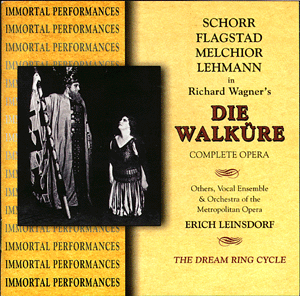In my review of Wagner's Siegfried on this site,
I set out the background and philosophy of the Immortal Performances
Series launched in January 2002.
Here we have a further instalment of what Richard Caniell
(correct spelling of his name this time!) has subtitled "The Dream
Ring Cycle". Indeed his essays on the Metropolitan Opera broadcasts,
and other performances, of the work presented are in themselves nearly
worth the price of the discs. Methinks though he justifies too much
the origin of the 'dream' cast on this recording which derives from
the fusing of two distinct broadcasts with slightly different casts,
albeit that the artists featured here did appear at the Met together
in the opera but no such performance was ever broadcast. Given modern
recording practices, with artists dubbing on their 'bit' some months
after everybody else, patching in bars after live performances, etc.
I suggest that only absolute purists will quibble if, as here, the ends
justify the means. We all can share Caniell's frustration that we miss
out on Thorburg as Fricka, but then if every dream became reality, life
would be boring!
As Caniell points out, Walküre is the turning
point in The Ring cycle, when Wotan's machinations and devious,
not to say deviant, behaviour comes home to roost. Indeed his Act 2
clash with his wife, followed by his long narrative (CD2 tr24) when
he confronts his failings, is the cycle's psychological centre. Wotan's
interpreter has to berate Hunding after the death of Siegmund, vent
his fury at Brünnhilde for her disobedience, and say farewell to
her as he summons Loge to surround her with fire. Of the famous Solti
recording, critics were split as to Hotter's performance; the great
Wotan of the 1940s and 50s caught too late said some. Here, we have
the great Wotan of the 1920s and 30s, Friedrich Schorr. Born 1888 he
had first sung the part in 1912 and arrived at the Met in 1924 dominating
his fach until his departure in 1943. We can hear on this recording
just why he was considered the outstanding exponent of the part in his
generation. Schorr's nobility of tone, smooth legato, ability to convey
the character's many moods are to be heard to good effect.
The other members of this 'dream cast' play their part
in making this recording memorable. Flagstad's gleaming, but full, tone
and ability to rise up the stave are a delight to listen to. Melchior
too plays his part with equally gleaming tone allied to forthright delivery.
Like Björling in the Italian repertoire, he could exhibit faults
with intonation and timing. His musicality is called into question by
some; if we had their like today the life of opera house intendants
would be a lot easier!
As well as featuring Schorr and Flagstad together,
another reason for fusing the broadcasts to is to have Lotte Lehmann'
Sieglinde. Like Schorr, she was born in 1888, (Caniell gives 1885) and
made her Met debut in the part in 1934 opposite Melchior; she appeared
on the roster until 1945. The outstanding Marschallin of her day she
had a voice of great beauty allied to innate musicality. Although getting
a little past her very best of the late 1920s and early 1930s, her portrayal
shows only briefly the fragility that was later to overtake her instrument.
None the less, in variety of colour and characterisation particularly
in tenderness with and passion for Siegmund, hers is a formidable portrayal.
List is reliable, no better, as Hunding, whilst Branzell's
Fricka is a formidable woman. Leinsdorf, underrated by many Wagnerians,
keeps the drama moving. The balance between orchestra and singers is
better I feel than on the earlier Siegfried where I found the
former too far forward.
Wagnerians, and others, used to listening to live performances
from this period will find much to enjoy. Oh, that in this super technological
age we could record a dream cast of this stellar quality.
Robert J Farr


